Electric furnace vs Gas, which is the better choice for your house?
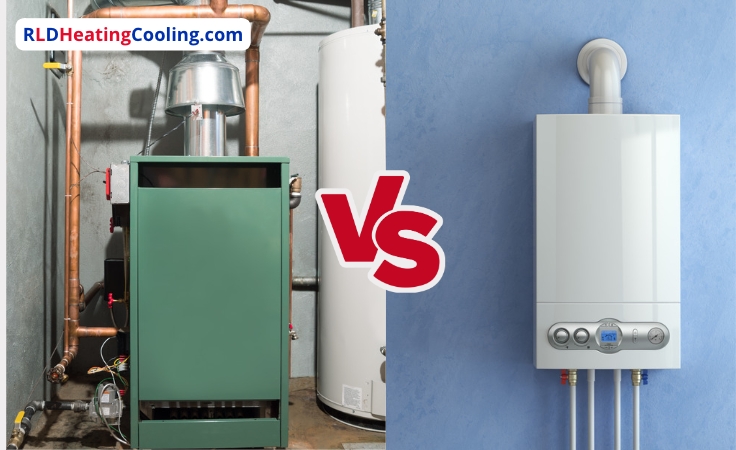
Generally, it is the classic point of discussion whether to get an electric or a gas furnace.
You can heat your home in several ways to keep it comfortable in those frigid & cool weather.
In this guide, we will compare both electric and gas furnace options.
However, you must not confuse the electric furnace with an electric heat pump. The reason is that an electric heat pump can heat and cool, while a furnace can only do the heating part.
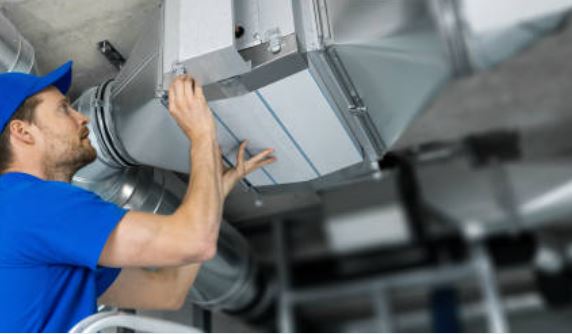
call 818-210-6669
Contact us 24/7 for your HVAC needs
Both the gas and electric furnaces can only produce heat.
To choose the best furnace for your house, it is crucial to carefully analyze the key points about both options:
- Cost,
- Size,
- Safety,
- Maintenance & more
We will also discuss and analyze the pros and cons of both systems.
So, let’s dive into it!
Factors to consider
Before you start reaching for the right furnace or HVAC Los Angeles for your house, you must ask yourself multiple questions:
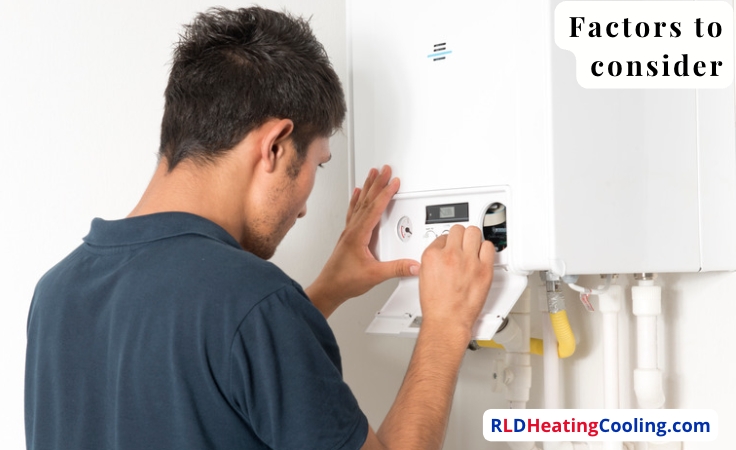
- Your budget.
- House.
- The weather conditions of the place you’re located in.
- The gas primary connection in your house
Once you are clear on all these questions, you can further drill down to other factors like:
Electric furnace vs. Gas Factor #1: Cost
In terms of costs, Gas furnaces are more expensive to purchase and install than electric ones.
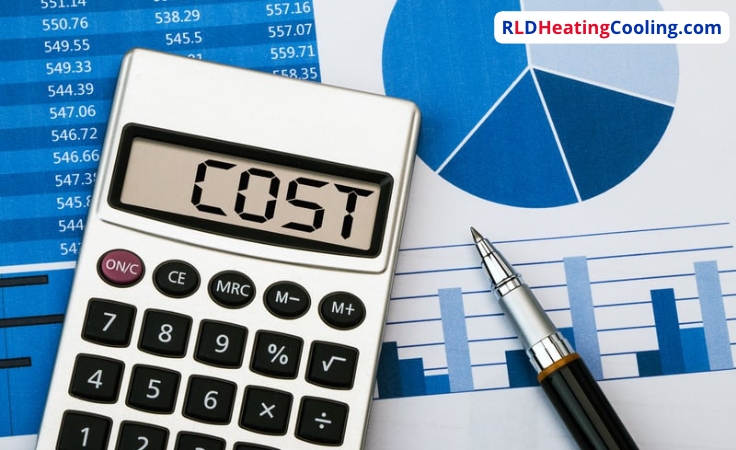
The electric furnace costs around $1000 to $2500, while the gas furnace ranges from $3000 to $4000 before installation. (1)
If we talk about the installation costs, the electric furnace installation can cost you around $1,000 – $1,500, while the gas furnace can be around $1,500 – $2,000.
So, the total cost of the gas furnace installation goes up significantly compared to the electric furnace.
However, the operational cost of the electric furnace is relatively high because it runs on electricity, and the gas furnace operates on natural gas.
So, with a high initial investment in gas furnaces, you can save a lot of money in the long run by avoiding energy expenses.
Also check out: Furnace vs HVAC.
Electric furnace vs. Gas Factor #2: Installation
When installing any HVAC equipment, it is better to take the help of professionals rather than relying on DIY.
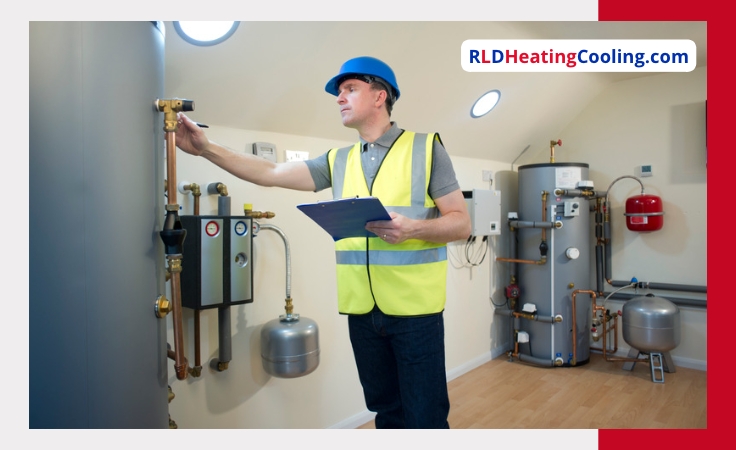
The main difficulty in installing the furnace is the safety factor which is especially crucial in gas furnaces as you have to deal with combustive elements.
Also, the heat exchanger and the other elements must be adequately sealed, so there is no risk of carbon monoxide leakage.
The heater installation requires specialized tools, equipment, heavy-duty wiring to the electrical breaker box and in-depth know-how, which can be difficult for a DIYer to handle.
The installation process is also a bit time-consuming, and even the professional HVAC team can take several days to completely install & set up a unit.
Apart from that, the gas furnace needs a vent outside your house, so if there is no vent, you have to cut into the wall to accommodate it.
Electric furnace vs. Gas Factor #3: Lifespan
Gas furnaces usually have a shorter shelf life than electrical furnaces.
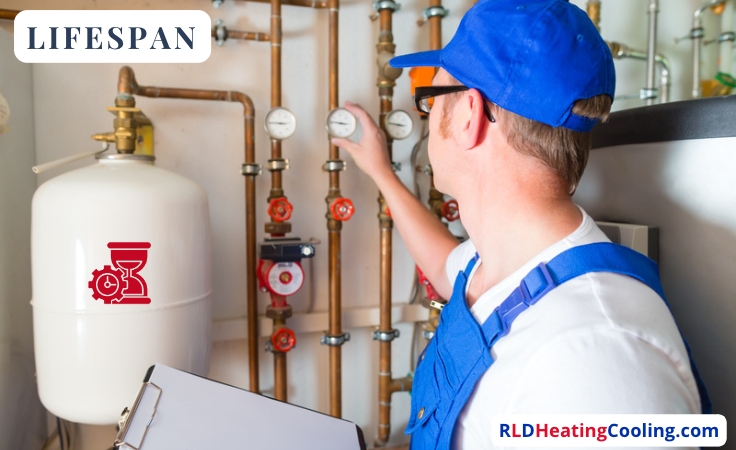
Electrical furnaces last around 20-30 years, while gas furnaces only last up to 10 to 20 years.
The main reason is that gas furnaces require regular maintenance; otherwise, the burner can clog with buildup.
The buildup usually happens because of the burner’s small particles, which keep accumulating.
If the buildup isn’t cleaned regularly, it can cause a system failure and you might have to spend on furnace repair.
Corrosion can also be a problem in various heat exchanger working parts.
Electric furnaces don’t have such problems as they run on electricity and last longer.
Electric furnace vs. Gas Factor #4: Safety
As a gas furnace functions on natural gas, it produces carbon monoxide, which can be dangerous if any leak occurs.
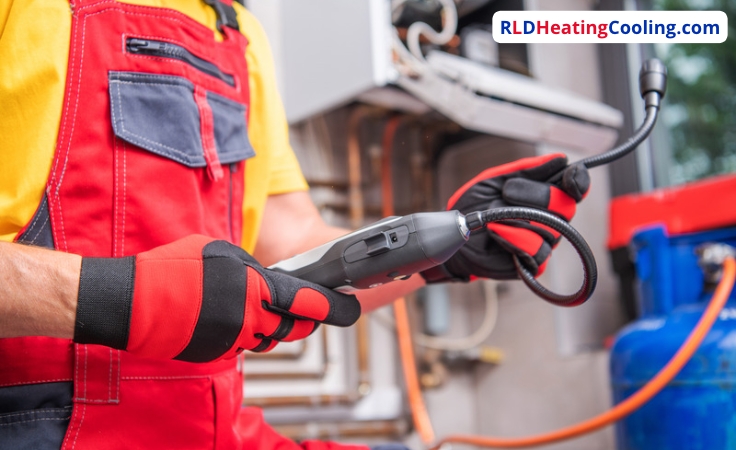
The leak might happen because of a crack in the heat exchanger.
It is the main reason why electric furnaces are safer than gas ones.
However, even gas furnaces can be safe if you regularly maintain the heating system, which automatically lowers the risk of a carbon monoxide leak.
Electric furnace vs. Gas Factor #5: Energy Efficiency
If we compare the gas and electric furnaces in terms of efficiency, the electric furnace will win.
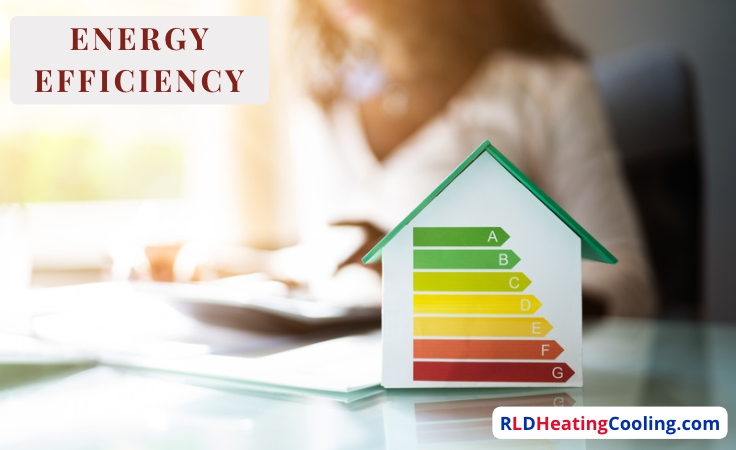
The annual fuel utilization efficiency rating in the electric furnace is 100 percent, while in the gas furnace, it is only 55 to 97 percent.
The primary reason behind the variation is the type of unit you choose and the amount of heat loss through the gas furnace flue and other areas.
The critical point to note is that energy efficiency only includes the amount of energy the furnace converts into heat, and not the rate at which it heats your house.
When it comes to electrical furnaces, all the energy consumed is converted into heat, while in the case of gas furnaces, it varies.
However, gas furnaces heat your home faster despite lower efficiency.
You can achieve higher efficiency in a gas furnace by switching to alternatives to the traditional pilot light, like direct spark, intermittent or hot surface ignition.
In addition to that, gas furnaces are cheaper, so they are better for colder climates.
So, if you live in a warmer climate, an electric furnace is a better option and vice versa.
Electric furnace vs. Gas Factor #6: Maintenance
Electric systems are easier to maintain and don’t need professional help, as there are no burners, and the system doesn’t require regular cleaning.

It makes the electric furnace system cheaper and easier to handle.
On the other hand, gas systems maintenance must be regular and periodic and carried out by an HVAC expert to keep them safe & up to the mark.
The gas line furnace should be cleaned and examined at least yearly.
It is primarily for safety reasons and to ensure that the system usually operates and has no signs of any dirt buildup or corrosion.
Also, as we know, the combustion oozes out small amounts of carbon monoxide, so it is essential to ensure that the system is sealed correctly.
Without the proper sealing, there might be a risk of leakage and poisoning.
Electric furnace vs. Gas Factor #7: Noise
An electric furnace is quieter than a gas furnace.

It is mainly because of the simple design with fewer moving parts and no vents or burners.
On the other hand, gas furnaces, though noisy, do not make a loud sound; there is just a typical whirring sound that is tolerable.
Electric furnace vs. Gas Factor #8: Functionality
The gas or electric furnace functions using a forced-air heating system.
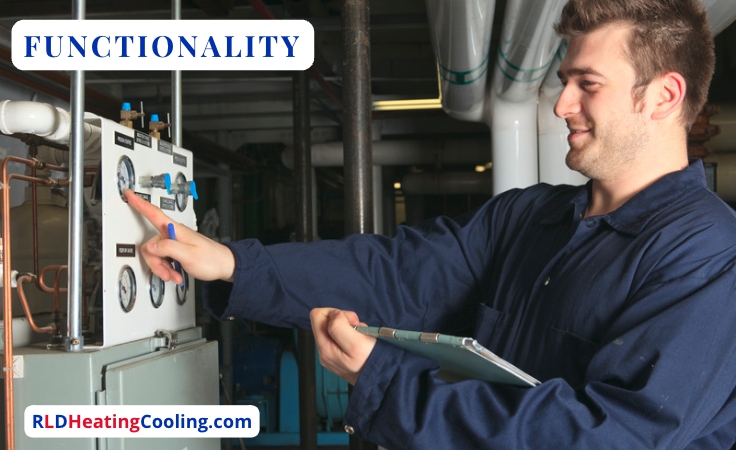
Also, both systems use a thermostat, so when the temperature drops below the heat set point on the thermostat, it sends a signal to the furnace unit.
In the case of gas furnaces, the signal will lead to the pilot light igniting the main burner of the heat exchanger. The pilot light is like a small flame that keeps burning.
The heat exchanger then heats the main burner and starts heating the air and circulating it in the house.
On the other hand, in the electric furnace, when the temperature drops, the thermostat sends a signal, and the heating elements are activated inside the furnace.
In both furnaces, the heated air is passed through the ductwork to the different rooms of your house, while the cold air is drawn through an intake vent and returned to the furnace.
The furnace shuts off the heating element when the desired temperature is reached.
The fan distributes the remaining heated air and shuts down as well.
Also, compare the functionality of electric vs oil furnaces here.
Electric furnace vs. Gas Factor #9: Utilities
One of the best advantages of an electric furnace is that there is no need for additional utilities.
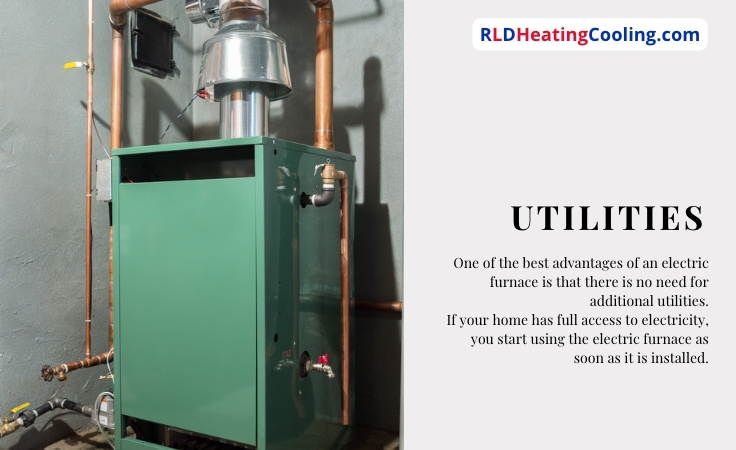
If your home has full access to electricity, you can start using the electric furnace as soon as it is installed.
On the contrary, using a gas furnace requires access to natural gas lines.
If your home doesn’t have it, you might have to get it installed. It can increase the overall installation cost, though it might recover in the long run due to enhanced efficiency.
Electric furnace vs. Gas Factor #10: Climate
The climate of your place significantly influences the type of furnace you should get.
It is because gas furnaces produce a lot more heat than electrical ones.
So, if you live in an extremely cold place and the temperature drops below the freezing point, an electric furnace may not be warm enough.
In such cases, you need a gas heater as it can heat your house quickly and much better, no matter how cold it is outside.
On the contrary, if the climate is temperate and you don’t need the heater very often, you might want to avoid getting involved in the gas furnace hassle; an electric heater will be enough.
If you live in a cold climate, consider the capabilities of a heat pump versus a furnace before making a final decision to purchase.
Electric furnace vs. Gas Factor #11: Eco-friendly
While the electric systems cut the risk of emissions caused by the gas systems, even electricity has some environmental impacts.

So, in such a case, the best you can do is choose an efficient unit with a better SEER rating.
Also, if your existing system is more than ten years old, a new system would be more efficient.
Pros & cons of the electric furnace
The pros of having electric heating are:

- Cheap & easy installation
- Easy maintenance
- Safe and Quiet
- Long lifespan
- Suitable for warmer climates
Cons of electric heaters are:
- Less efficiency
- Higher heating costs & energy bills
Pros & cons of a Gas furnace
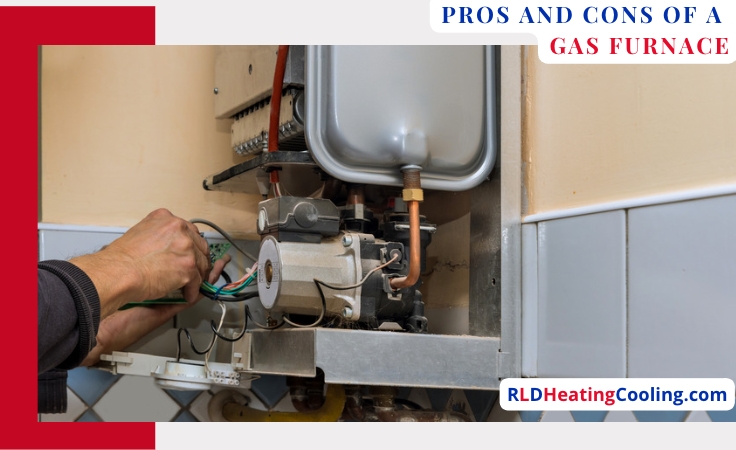
The pros of gas heating are:
- Lower fuel cost
- Lasts up to 20 years
- Higher efficiency
- Suitable for colder climates
Cons of gas units are:
- Expensive cost & installation.
- Difficult to install
- Combustible gas emission
- Needs professional maintenance
- Noisy compared to the electric furnace
Compare the pros and cons of a gas furnace and a heat pump to determine which one suits you best.
Choosing your ideal HVAC system
By now, everything in this article should make a lot of sense about the option you should choose.
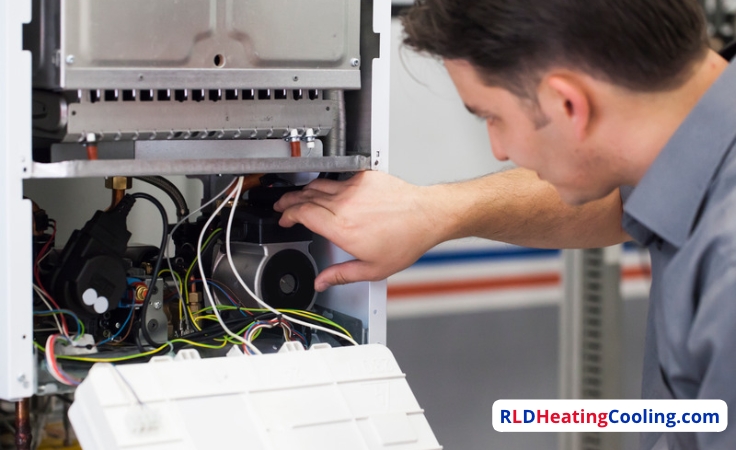
However, if you still have doubts about this and are trying to search for a ‘heating service near me’, we at RLD Services are there to help you.
We will help you choose the right option for your house according to your needs and demands.
Our team of licensed HVAC contractors will conduct an assessment to determine the best solution for your home.
Contact us to book an appointment.
Also check out: Heat pump vs electric furnace.
FAQS

Here are some of the questions people usually ask:
Which are the best electric furnaces or gas furnaces?
Both systems have their own set of pros and cons.
Gas furnaces are costlier to install and purchase, but pocket-friendly in the long run, as no additional electricity expense is involved.
Also, they are more potent than electric furnaces; however, in terms of safety, they are better.
Regarding environmental friendliness, gas furnaces are better, and you can pair them up with a cooling system.
What are the three advantages of an electric furnace?
Three advantages of switching to an electric furnace are:
- Electric furnaces are safer than gas furnaces.
- Better efficiency
- Longer lifespan
What is the most significant disadvantage of having electric heat in a home?
The most significant disadvantage of getting an electric furnace is that it’s not cost-effective, as it runs on electricity. So you have to bear the energy bills.
Should I convert the gas furnace to an electric one?
Switching to a gas furnace from an electric furnace is the best decision you can make.
Gas furnaces are cost-effective, environmentally friendly & boost your indoor air quality.
So, you get cleaner air without any holes in your pocket.
Resources
https://www.carrier.com/residential/en/us/products/furnaces/electric-furnace-vs-gas-furnace-vs-oil-furnace
